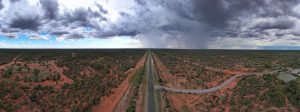The licence for ‘Cooleyarbooro’ at the ’22-Mile-Peg, Wanaaring Road’ was granted to James Sibraa in 1889, 1890 and 1891. Bridget Ellen Sibraa became the licensee of the premises in August 1892, with the death notice for her husband, James, appearing in the Western Herald in May the same year. The site of the premises was presumably advantageous because there appears to have been significant artesian exploration occurring in the area at that time.
Artesian drilling plants opened up a site at ‘Mr Sibraas’, later known as ‘ Sibraas Bore’ and subsequently ‘Cooley Arbor’ finding water at 1021 feet, with an estimate flow of half a million gallons per day of first class water in 1893. The report in the Australian Pastoralists Review of the same year says:
“The Bourke-Hungerford Road will, with the completion of one more bore, be almost the best watered track in the district…”
The license was granted to Mrs Sibraa in 1893 for ‘Cooleyarbooro’ and then in 1895 and 1896 for the Coolyarboora Hotel situated on the Wanaaring Road. Part of Bourke Licensing District, the hotel appears to have been incorporated into the ‘Government Watering Places’ following this time, with many reports of parties, interspersed with disagreements and charges of ‘bad language’ in relation to the site.
Bridget Ellen Sibraa appears to have pursued her career as a publican, becoming quite well known and respected in Orange, and popping up in various articles including the following from the Wellington Times in 1906:
AN ORANGE FRAUD.
MISS SIBRAA VICTIMISED.
A respectable-looking man named Albert William Bulmer Davis was placed on his trial at the Sessions on Tuesday in answer to a charge of having, at Orange, obtained the sum of £50 from Miss Bridget Ellen Sibraa by false pretences.
Miss Sibraa, at the time of the offence was in business near Tattersall’s hotel, Orange. The accused, a commercial traveller, induced her to place £50 in his hands to speculate for her.
He left Orange, and some time afterwards Misa Sibraa commenced to inquire what had become of her money. She received several letters from the accused, in which he made numerous excuses. Failing to get any satisfaction, Miss Sibraa took proceedings.
Accused gave evidence on his own behalf, detailing his dealings with Miss Sibraa. He denied that he ever suggested any speculation or told her any thing about any shipping transaction.
He said the money was a loan, and he promised her 15 per cent, which amount he had added to the original £50 in making out the promissory note His reference to Messrs McNair and Robets in his letter was commercial’ subterfuge to obtain time. He wrote the letter purely to allay Miss Sibraa’s alarm as to the safety of her money.
The accused afterwards addressed the jury at some length. The jury returned a verdict of guilty, and the prisoner was remanded for sentence.
Wellington Times in 1906


